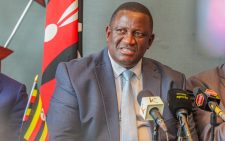Lawmakers up in arms over CBC’s poor implementation

There was uproar in the National Assembly over the implementation of the Competency-Based Curriculum (CBC) after lawmakers accused the government of being ill-prepared for the transition of the first cohort of Grade Eight to Grade Nine, next year.
Lawmakers accused the government of failing to put in place adequate infrastructure, employ more teachers as well as conduct adequate training for teachers.
While discussing an adjournment motion sponsored by Kathiani MP Robert Mbui, the MPs said it is regrettable that teachers are being forced to teach learners when they are ill-equipped due to the failure by the government to set aside adequate funds for the exercise.
The lawmakers claimed that the situation is so bad that even teachers themselves have raised concerns over the syllabus being crafted by the Kenya Institute of Curriculum Development (KICD) saying it has errors, which ought to be addressed before the transition takes place.
Led by Mbui, the MPs said that despite almost 1.5 million students awaiting transition from Grade 8 to Grade 9 in over 32,000 schools in the country in the next three months, the Ministry of Education is still not prepared for the transition.
Increased apprehension
Mbui in particular regretted the transition into Grade 9 has caused increased apprehension among parents and widespread concern on the preparedness of the education sector with regard to the transition.
He also claimed that the confusion is also due to the shift on where the infrastructure in schools was to be domiciled.
Initially it was meant to be lodged within secondary schools but then when President William Ruto government took over power, it constituted the Presidential working party on education reforms, which recommended this transition remain in primary schools, implying that the Junior Secondary Schools remain domiciled in primary schools.
Said Mbui: “We require 32,469 classrooms and that is only on the assumption that every one of the schools requires only one class. There are schools with 3 or 4 streams, so we are probably requiring almost 60,000 classrooms. Do we have the classrooms and if we don’t, what are we going to do so that we can have them in the next three and a half months?”
Notorious problems
He added: “We also require teachers and the teacher issue is one of the most notorious problems that we have. We have talked about free education for a long time, even primary schools we say we have free primary education but if you go to more schools you find there are not enough teachers, so the parents have on a regular basis got to contribute to pay teachers. Now when parents pay for teachers, what do we call that free education?”
The uproar by the lawmakers comes at a time when 1.3 million grade eight learners are set to transition to Grade Nine in January. The Grade 9 will however remain in primary schools, in line with recommendations of the Presidential Working Party on Education Reform.
January will see the first cohort of CBC learners join Grade Nine. There are 23,286 primary schools according to 2013-2021 Ministry data.
Last week the National Treasury said that the Teachers Service Commission (TSC) would only be able to hire the 46,000 Junior Secondary School intern teachers into permanent and pensionable terms from January 2025. The JSS teachers are supposed to teach grade nine learners,
Last month Principal Secretary for Basic Education, Belio Kipsang disclosed that the construction of 11, 000 classrooms is ongoing countrywide in preparation for Grade 9 pupils. He reported that the ministry had allocated an extra Sh1 billion for schools in Nairobi County because of their unique challenges
Kipsang said 5, 000 classrooms will be constructed by the National Government Constituency Development Fund, to achieve a total of 16, 000 units that were needed for the Grade 9 pupils.
“As we speak, 11, 000 classrooms are at various levels of completion countrywide. We are working with members of parliament and NG-CDF to support us with 5, 000 classrooms,” he said.











